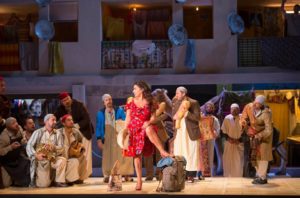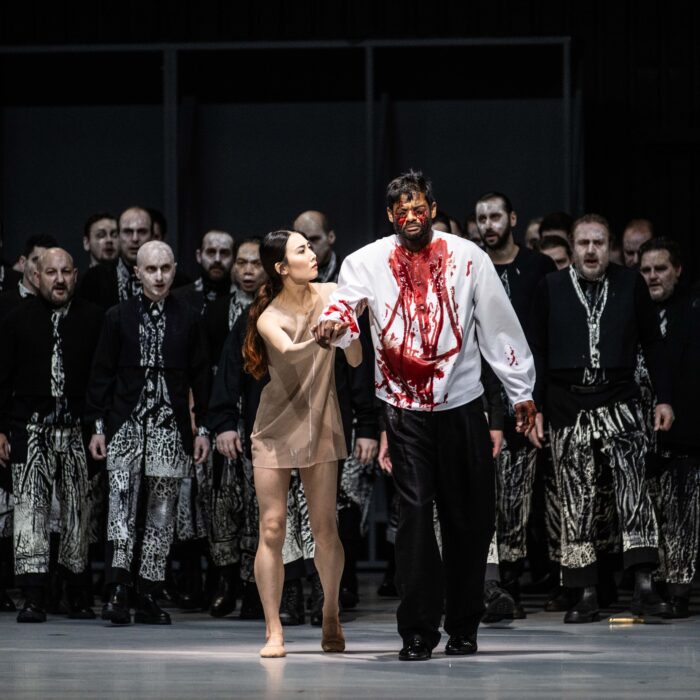
Whitsun Festival Salzburg 2018 Review – L’Italiana in Algeri: Cecilia Bartoli Stars & Leads The Way In Rossini Comedy
By Lois SilversteinWhat could be a more wondrous opera evening than a marvelous ensemble performance that showcases a brilliant opera star? Salzburg’s Whitsun Festval’s “L’Italiana in Algeri” was one such instance.
Directed by Moise Leise and Patrick Caurier, and headlining mezzo-soprano par excellence Cecilia Bartoli, the production exceeded all expectations. This Opera Buffa, written when Rossini was a mere 21-years-old and here conducted by Jean-Christophe Spinosi, was more than – “just a funny face.”’ Not only was it a vehicle for gender disparities, but a cultural clash as well. It was sung with great skill that left not one moment void of energy, wit, enthusiasm, or good humor. Even a rather predictable – well, not completely predictable – set of circumstances centering on men bullying submissive and longing wives – got a fresh presentation and a rousing one. Rarely do we attend an opera in which “oohs” and “ahs” couple with first-rate comic acting and vocal perfection. This “Italiana” was just such a feat.
The Heroine As Team Player
Bartoli was superb. Appearing first in an adorable red sundress, complete with platform shoes, smart straw hat, and sunglasses, she sang from start to finish with precision and gusto. Never did she leave her character and always presented the Italiana, Isabella, with fire and finesse. Every facial expression, every hand and leg gesture, brought Isabella to life. With suitcase in hand, she “wooed” Mustafa, and Taddeo, and Lindoro, only “coincidentally.” Here she cavorted around the stage in a glamorous white robe in humoresque seduction. Her singing never flagged. Her intonation never wobbled. Her highs and her lows landed right on the mark. More than satisfying, Bartoli’s singing was a masterpiece. More importantly, she was a team player, never failing to lead and play with her fellow artists with ease and grace.
Mustafa, played by Peter Kálmán, the duped Bey, sang and acted with more than elan. His comedy and his voice rang in complete harmony with Bartoli’s. His rich, bass-baritone was more than nimble. He marked his moods with energetic abandon: petulance, disdain, longing, lust, viperous annoyance. You name it. His gifts were on full display. He was willing to appear as a mocked man in skimpy underwear and bathrobe hiked above his waist. He also appeared in a skull-cap with wagging silver sprouts from its top, peering over a screen lasciviously leering at his apparent prey, while she adorned herself with bubbles. He even glided around on a moving chair in the dance with Bartoli. All the while, he never sacrificed his rich, round voice to any mugging for the sake of it. He was terrific.
Taddeo, played with equal aplomb by Alessandro Corbelli, carried out his role as baritone foil with ease. He stripped down to his Superman underwear and dressed up in fuchsia satin athletic suit, teasing taunting, wistfully longing for the Italiana to throw him a crumb. His consistent singing, his marked presence in almost every scene with active attention and humor was the ultimate reward.
The same for Edgardo Rocha as Lindor. The tenor sang with youthful ebullience, rich, fine-toned singing – sometimes his top notes weren’t all full on the mark- but he satisfied from the opening. Longing, desire, frustration, petulance, helplessness, energy all revealed themselves in his interpretation. It is not always the young tenor who calls on authentic sympathy in such a role, but this Lindoro did, and rather than pity for him, we found ourselves rooting for his success with Isabella. Rossini had his mind on making quasi-heroes as well as full-scale ones when he composed this early work. Maybe that’s what made it more than a merely feel-good affair.
Rebeca Olvera, as Elvira, sang with ease and beauty as well as holding up her end of the unfolding comedy. Olvera acted out the overture with Mustafa, performing with such vigor and conviction that it was easy to sympathize with her. She carried it all out with abundant vitality, and pulled out all the stops. As did her mother Zelma, played by Rosa Bose. They were a chorus of two adjunct to the vivacious Isabella, and benefitted from her leadership,
Musical Supporters
Haly, played with aplomb by Jose Coca Loza, executed his role with appropriate servility and conflict; he knew his place and although eager to stand up to his “boss,” he did what he was supposed to and brought about the resultant comedy with skill.
The full chorus, Philharmonia Coro Wien, led by Chorus Master Walter Zeh, and Ensemble Matheus, sang and acted in full style; from hand-guns and stage-driven automobile, moving divans, video screen extension of their songs and antics along with down-stage narrative activity, enriched the immediate joking, and lifted it up to a more extensive level. Their sound resounded, but never too loud or raucous or too minimalistic. They were there to be counted on. They grounded the extravagant solos with beautiful grace and sonority.
Rossini’s music, led by Spinosi, led the way. It was a musical holiday and Bel canto abundance ruled the day. So satisfying musically, the orchestra was vigorous in its lead and presence, its playing brisk but not too fast; smooth but not diffuse; eager but not dominating. We heard the sound of Rossini well-articulated and feasted on its pleasures as did his audience over a century ago.
Stunning costumes by Alessandro Calvaca, flexible sets by Christian Fenouillat. with its various moving parts, were far more than decorative. They were more a Greek chorus of sorts. As directors Leise and Caurier indicate, who might not want to expand his and her imaginative vision when such lively and sonorous music guided the show?
“L’Italiana in Algeri” will be replayed in the Salzburg Summer Festival. Lucky for all the forthcoming audiences which will experience opera like this and remember the richness of its wealth of sound, spirit, and art. They’re in for a treat.


